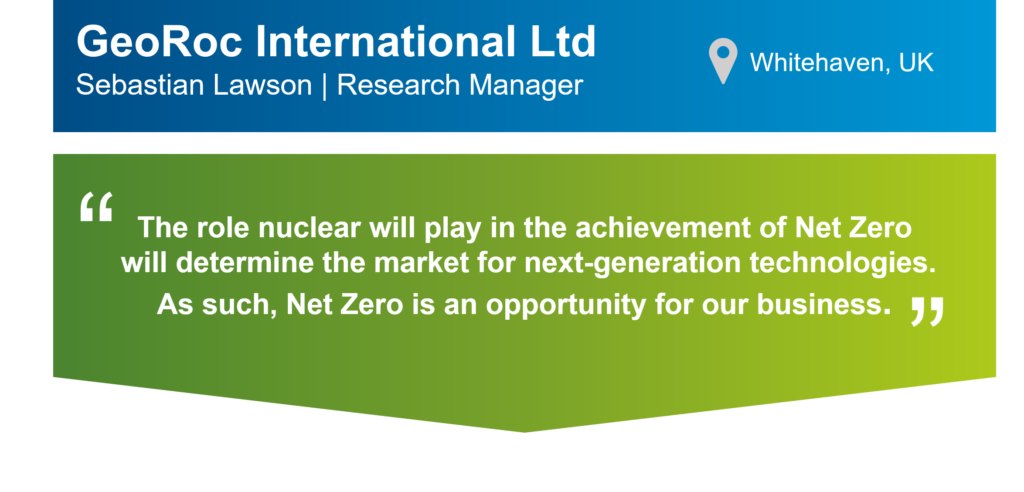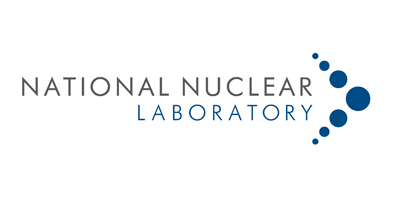Reviving sustainable solutions for long-term success
AQUEOUS RECYCLE | INNOVATION | PEOPLE AND SKILLS | SUPPLY CHAIN AND ECONOMY | WASTE IMMOBILISATION TECHNOLOGIES | WORLD-CLASS FACILITIESNet Zero is mobilising businesses to centre sustainability at the forefront of advanced fuel concepts. Sebastian Lawson, Research Manager at SME GeoRoc Ltd, explains how the company is developing innovative treatment solutions to ensure the future fuel cycle remains environmentally conscious.

Challenge
Securing trusted treatment for future fuel products
Our work focuses on improving the long-term environmental safety of nuclear waste generated by the next generation of nuclear reactor operations. Through AFCP, GRI Ltd is targeting the delivery of advanced radioactive waste processing technologies. The role nuclear will play in the achievement of Net Zero will determine the market for such technologies. As such, Net Zero is an opportunity for our business, as GRI Ltd’s technologies aim to improve the safe, long-term management of wastes produced from nuclear power generation.
We are committed to delivering sustainable solutions that will enable the UK to achieve its Net Zero objectives while maintaining and securing public trust and confidence. A challenge our sector faces is increasing public understanding of nuclear power generation, building confidence that effective radioactive waste management technologies are available and support the delivery of the nuclear power renaissance. This emphasis on sustainable waste management will in itself help the UK achieve its Net Zero objectives.
Solution
Modernising methodology with environmental consideration
The AFCP project we are involved in is reviving and updating a processing methodology for safely treating radioactive waste. This process offers significant benefits over existing solutions by supporting the production of ceramic, rock-like wasteforms. These wasteforms offer numerous benefits for the long-term environmental safety of radioactive wastes, where naturally occurring analogues have been shown to retain radioactive waste elements for millions of years.
Impact
Sustainable innovation today, sustainable infrastructure through tomorrow
Despite their widely acknowledged benefits, the technologies GRI are developing require validation before scaling up to commercial deployment. Through AFCP collaboration, our work supports such efforts as well as the future uptake of improved waste treatment technologies, both in the UK and internationally.
Commercialisation: In supporting our developmental efforts both at an R&D level and in scaling up such technologies to commercial deployment, programmes such as AFCP are fundamental to our success. AFCP is increasing the likelihood of further nuclear power implementation and creating new target markets for our business, while advancing global adaptation of improved, environmentally-sound radiation waste management solutions.
Skills: AFCP has allowed us to revive the extensive expertise in this field contained within GRI’s team. The programme is providing us with a forum to transfer knowledge from our highly experienced team members to younger engineers and scientists, a process which is invaluable for long-term success. Our team are passionate about the potential of this ceramic wasteform technology and our AFCP project has allowed us to revive this processing option while coupling it with modern developments.
Infrastructure: AFCP has enabled us to set up a pilot-scale wet chemical treatment facility for investigating the key front-end processing. This facility will be an invaluable component in allowing us to collect data and make improvements to these waste treatment technologies, thereby supporting the UK and international community in delivering the safest and most effective radioactive waste treatment technologies possible.
Together, our work through AFCP will not only improve the long-term environmental safety of treated radioactive waste, but will also contribute to increased public understanding around radioactive waste management for the next generation of reactor operations. This may increase the likelihood of further nuclear power implementation, resulting in increased market size for sustainable technology offerings as the UK moves toward a Net Zero future.
AFCP is part of the Department for Business, Energy and Industrial Strategy (BEIS) £505m Energy Innovation Programme.
